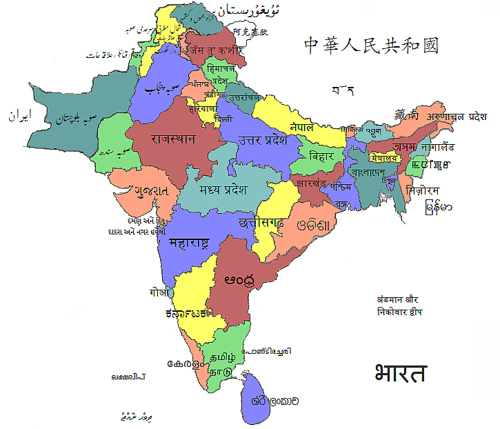 In India, Sociolinguists become little children in a big candy shop: spoiled for choice. Languages crisscross India like the fabric on a Scottish kilt or the Madras cotton print saris. Languages are like brightly colored stripes that blend into another color when they intersect, then continue merrily alone as they were before. There is little if anything homogeneous about India. It is a bouquet of cultures, classes, and religions. It is a linguistic kaleidoscope. To the visitor, it can be chaotic. This confluence or “sangram” of languages in India means that no Indian will understand the language of all Indians.
In India, Sociolinguists become little children in a big candy shop: spoiled for choice. Languages crisscross India like the fabric on a Scottish kilt or the Madras cotton print saris. Languages are like brightly colored stripes that blend into another color when they intersect, then continue merrily alone as they were before. There is little if anything homogeneous about India. It is a bouquet of cultures, classes, and religions. It is a linguistic kaleidoscope. To the visitor, it can be chaotic. This confluence or “sangram” of languages in India means that no Indian will understand the language of all Indians.
Imagine if you were visiting Europe. Each country would have a different language and culture. In India, many states have a different language and culture. So what happens when Indians move or shift as they say to another place in India? What happens when they have to deal with someone from another religion who speaks a different language or dialect? They adjust. Indians are far more sensitive to what linguists call paralinguistic features or body language than most Westerners. Indians are not as limited to language as citizens from a mono-lingual nation. From childhood, they did not always understand what people were saying around them, so they learned to read faces, the tones of a voice, the nod of the head, the windows of the eyes, the quick wave of a hand, or the stance of the body. As children, we were all like this, but Indians needed to keep these skills.
Words don’t mean the same thing or have the same value in a multi-lingual society. So when a Westerner trainer or business person works with Indians, they are sometimes under the illusion that their words are doing all the communicating. They forget that the body language is signaling a lot more to the participants who can be confused when the words don’t match the body language. Learning doesn’t take place in seminars. Ideas are not exchanged in meetings. Directives cannot be obeyed because they weren’t understood. The speaker may say, “You’re doing a good job,” but the body language shows a tightness and insecurity, and the listener isn’t sure if the words are true.
Many westerners, especially those who live in urban communities, have lost the instinct to pick up non-verbal signals from others. What can be done? Relax. If you have that peace of mind, then you will give out the right signals. If you are calm, you can pick up non-verbal communication in others and respond accordingly.
Comments are more than welcome. I would like to learn more about this subject from you.